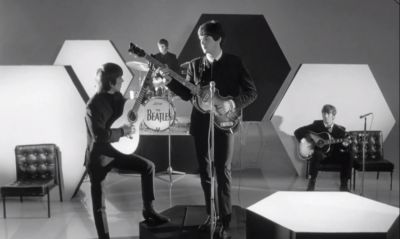
TUTTI PER UNO - A HARD DAY’S NIGHT
(A Hard Day's Night, GB/1964) di R. Lester (87')
Scen.: Alun Owen. F.: Gilbert Taylor. M.: John Jympson. Scgf.: Ray Simm. Mus.: John Lennon, Paul McCartney, George Martin. Int.: John Lennon (John), Paul McCartney (Paul), Ringo Starr (Ringo), George Harrison (George), Norman Rossington (Norm), Anna Quayle (Millie), Victor Spinetti (dirigente televisivo), Wilfrid Brambell (nonno), Deryck Guyler (ispettore di polizia), Phil Collins (uno dei fan). Prod.: Proscenium Films, Walter Shenson Films. DCP. D.: 87'. Bn. Versione inglese / English version
Da: Criterion Negativo originale scansionato in 4K presso Sony Colorworks. Restauro a cura di Criterion / The original negative was scanned in 4K at Sony Colorworks and the restoration was curated by Criterion
Alla presenza di Richard Lester, in occasione del cinquantennale del film
Serata promossa da Aeroporto di Bologna
Assistere a una proiezione di A Hard Day's Night in un cinema di quartiere - allora esistevano ancora i cinema di quartiere, e i quartieri - era un'esperienza affascinante e molto divertente. Nelle prime settimane di programmazione il cinema era dominato da schiere di fan urlanti. Gradualmente l'isteria e i portafogli si assottigliavano e i Beatle-maniaci abbandonavano le sale per far posto ai Beatle-fan come me, altrettanto entusiasti ma più tranquilli. Se tornavamo a vedere il film più e più volte, era prima per capire, poi per goderci appieno la brillante sceneggiatura a quattro voci di Alun Owen e le euforiche acrobazie della cinepresa di quell' americano espatriato, Richard Lester. Oggi A Hard Day's Night conserva tutta la sua forza, il suo buonumore, la giovialità e la cortesia tipiche dell'atmosfera delle Midlands. Apprezziamo ancora la mano sicura con cui Lester dirige le sue star, come se fosse un indulgente fratello maggiore, e nell'assenza di presunzione di questa sicurezza riconosciamo il 'verso libero' di un personalissimo ritmo cinematografico (dove di tanto in tanto la macchina da presa indugia sull'istante di divertimento o di umiliazione di un personaggio secondario). Nel film ritroviamo quello che allora sollecitava la nostra adesione: la perfetta sintesi di un momento in cui, per molti di noi, era bello essere giovani. La perdita di quel momento, e di quella giovinezza, possono renderci malinconici quando riguardiamo (specie se da soli) A Hard Day's Night. Perché noi siamo invecchiati, e il film no. Dieci anni dopo ci rendiamo conto che era un rito di passaggio - glorioso - verso il nulla.
Richard Corliss, "Film Comment", maggio-giugno 1974
Si potrebbe dire che il montaggio frammentato sia essenzialmente una derivazione della nouvelle vague (come si potrebbe dire che John Lennon qui è una versione britannica di Jean-Paul Belmondo, cosa che effettivamente è), ma ci sono almeno due differenze: lo stile e l'accessibilità. Il film di Lester applica l'approccio nouvelle vague a modo suo e con piglio più ottimista. E poi, se vogliamo essere realistici, l'impatto e l'influenza (negli Stati Uniti e in Gran Bretagna) di un film in lingua inglese con i Beatles sarà molto più profonda di quella di tutti i film della nouvelle vague messi insieme.
Ken Hanke, "Films in review", febbraio 1993
Seeing A Hard Day's Night in a neigh borhood theater - there were still neighborhood theaters, and neighborhoods, back then - was a fascinating experi ence, and a lot of fun. In the first few weeks of the film's run, the house was dominated by the hard-core screamers. Gradually, hysteria and overdrawn al lowances depleted the theaters of these Beatlemaniacs, and my crowd - the Beatlephiles, just as enthusiastic but cooler - took over. If we went back again and again, it was first to comprehend, and then to savor, the witty fourplay of Alun Owen's script and the high-spirited camerabatics of that expatriate American, Richard Lester. A Hard Day's Night today retains its vigor, its good humor, its Midlands courtliness and easy grace. We can still appreciate Lester's guiding hand on his stars, like an indulgent older brother, and recognize in its least self-conscious form the 'sprung rhythm' of his film tempo (when the comic pace is broken by a lingering shot of a bemused or humili ated bit player). We can also find in the film what we responded to then: its perfect distillation of a moment when, for a lot of us, it felt good to be young. The loss of that moment, and that youth, may make us melancholy when we watch A Hard Day's Night today, especially alone. We've aged, and it hasn't. Looking at the film a decade later, we realize it was a glorious rite of passage to nowhere.
Richard Corliss, "Film Comment", May-June 1974
It can be argued that the fragmented editing style is basically an outgrowth of the French New Wave film (just as it can be argued that John Lennon here is a British version of Jean-Paul Belmondo - and he is), but there are two very pertinent differences: attitude and accessibility. Lester's film applies the approach in its own way and in a much more upbeat trame of mind. Plus, if we are realistic, the impact and influence of an English language film with the Beatles is far more profound in general in the U.S. and Britain than all the French New Wave films put together.
Ken Hanke, "Films in Review", February 1993
(In caso di pioggia, la proiezione si sposterà al Cinema Arlecchino)

Tariffe:
Ingresso libero

Documenti
Tipo di File: PDF Dimensione: 656.66 Kb











